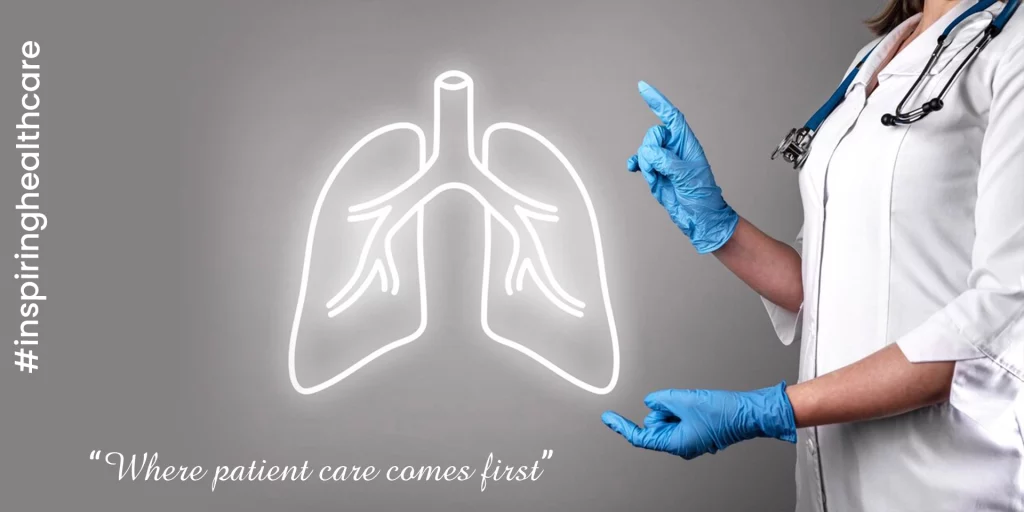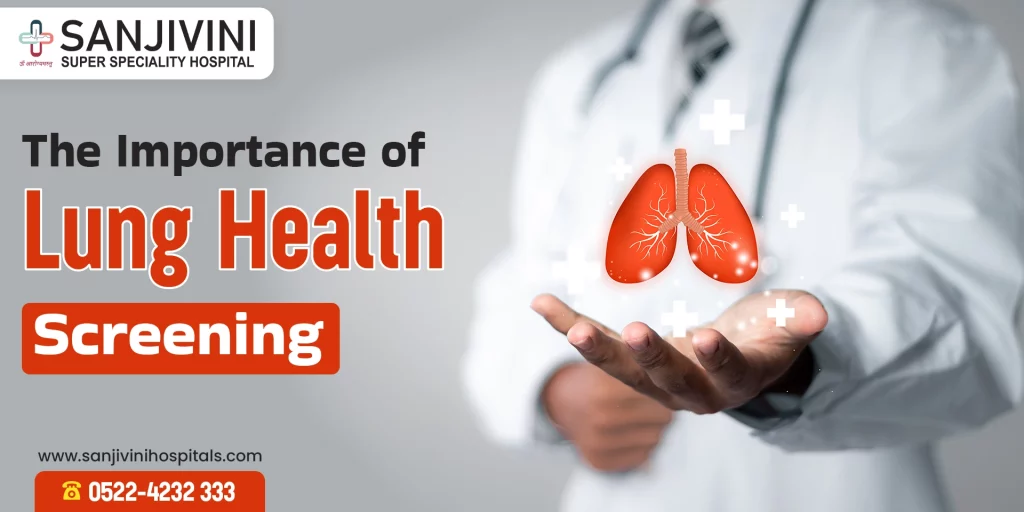Medically Reviewed by: Dr. Abhishek Gupta MBBS, MD-FIP EDARM
Have you ever thought about the superheroes inside your body? Well, let’s talk about the unsung heroes that help you breathe – your lungs! They work hard every day, bringing in fresh air and making sure your vital organs get the oxygen they need. But here’s the catch – these superheroes sometimes face challenges, and we may not even know it until it’s too late.
Imagine this: your lungs facing an enemy, a bad guy called a respiratory disease. The thing is, these villains can be sneaky and quiet, often causing trouble without us realizing it. So, how can we help our lung superheroes stay strong and healthy? That’s where the magic of “Lung Health Screening” comes in!
Understanding Lung Health
The Lungs: Oxygen Exchange Maestros
- Vital organs in the respiratory system.
- Responsible for oxygen and carbon dioxide exchange.
- Airways, bronchi, and alveoli are crucial for gas exchange.
- Conditions like asthma, COPD, and pulmonary fibrosis affect these components.
- Resulting in diverse respiratory symptoms.
B. Common Risk Factors for Lung Diseases
- Smoking and secondhand smoke exposure.
- Risks associated with chemicals, fumes, and asbestos.
- Impact of outdoor and indoor air pollution.
- Increased vulnerability for individuals with pre-existing respiratory conditions.
C. The Stealthy Nature of Early-Stage Lung Conditions
- Early-stage conditions are often undetected.
- Emphasizes the need for regular check-ups.
- Heightened awareness of symptoms is crucial.
- Symptoms include persistent cough, shortness of breath, chest pain, and wheezing.
- Particularly important for individuals at higher risk due to smoking, occupational exposures, outdoor and indoor pollution, or a family history of lung disease.
Also Read: Introduction to Pulmonology and Sleep Care
The Need for Early Detection
- Early Detection Significance:
- Vital for a better lung cancer prognosis.
- Screening methods like low-dose CT scans are crucial for effective treatment.
- Screening Recommendations:
- American Cancer Society and U.S. Preventive Services Task Force advocate yearly low-dose CT screening.
- Targeted at individuals aged 50 to 80 with significant smoking history, current smokers, or those who quit within the past 15 years.
- Impact on Mortality:
- Studies show that low-dose CT screening reduces mortality for high-risk individuals.
- Emphasis on the pivotal role of early detection in improving survival rates.
- Current Diagnosis Statistics:
- Only 26% of lung cancers are diagnosed early nationwide.
- Underscores the need to heighten awareness and enhance screening accessibility.
Types of Lung Health Screenings
- Preferred Screening Method: Low-dose computed tomography (LDCT) is the recommended test for detecting lung cancer.
- LDCT Process: In LDCT, a minimal radiation dose is used to create detailed lung images.
- Effectiveness in High-Risk Individuals: Research shows LDCT screening reduces the risk of lung cancer-related death, particularly in heavy smokers.
- Limitations of Chest X-rays and Sputum Cytology: Despite being studied, these methods haven’t been proven to significantly decrease the risk of dying from lung cancer.
- Pulmonary Function Tests (PFTs): While useful for assessing lung capacity, PFTs are not recommended as a screening test for lung cancer.
- Exploration of Emerging Technologies: Ongoing clinical trials are investigating new technologies for lung health screening.

Who Should Consider Lung Health Screening?
- High-risk Populations:
- USPSTF recommends annual lung cancer screening with LDCT.
- Targeted at adults aged 50 to 80.
- Criteria: 20-pack-year smoking history, current smokers, or those who quit within the past 15 years.
- Age-related Considerations:
- American Cancer Society suggests yearly LDCT screening.
- Applicable to individuals aged 50 to 80.
- Focus on current smokers or former smokers.
- Importance of Personalized Risk Assessments:
- Screening for asymptomatic adults at high risk.
- Involves testing without symptoms or disease history.
- Sole recommended screening test: LDCT for lung cancer.
Benefits of Lung Health Screening
- Benefits of Lung Health Screening:
- Early intervention and treatment options
- Cost-effective preventive measures
- Improved overall quality of life
- Effectiveness of Lung Cancer Screening:
- Low-dose computed tomography (LDCT) reduces lung cancer mortality in high-risk populations
- Early detection leads to better treatment outcomes
- Identification of Various Lung Conditions:
- Screening helps detect conditions like chronic obstructive pulmonary disease (COPD)
- Contributes to overall lung health improvement
- Target Audience for Screening:
- Generally recommended for individuals in good health
- Not suitable for those with poor lung function or serious health problems
Addressing Concerns and Misconceptions
- Common Concerns:
- Fear of radiation exposure, false positives, and unnecessary procedures are common worries related to lung health screening.
- Benefits of Early Detection:
- Emphasize that the advantages of identifying and treating lung cancer early through screening outweigh the associated risks of radiation exposure.
- Minimizing False Positives:
- Acknowledge that false positives can occur but stress that careful selection for screening and appropriate follow-up can minimize these occurrences.
- Radiation Exposure in Perspective:
- Highlight that the radiation used in low-dose computed tomography (LDCT) for lung health screening is much lower than that in standard CT scans.
- Low Risk of Cancer from Screening:
- Reassure readers that the risk of developing cancer from radiation exposure during LDCT screening is exceptionally low.
- Importance of Communication:
- Stress the significance of open communication between patients and healthcare providers to address concerns and misconceptions.
- Healthcare Provider Guidance:
- Encourage individuals to consult with healthcare providers who can provide detailed information about screening benefits, risks, and address any concerns.
- Shared Decision-Making:
- Emphasize the collaborative approach between patients and healthcare providers for shared decision-making in determining the appropriateness of screening based on personal risk factors and preferences.
Also read: Embracing a Healthy Lifestyle for Respiratory Wellness
The Role of Lifestyle Choices in Lung Health
- Smoking Cessation Programs:
- Crucial for lung health.
- Reduces the risk of lung cancer.
- Highly recommended for improvement.
- Regular Exercise:
- Aerobic and muscle-strengthening exercises.
- Enhances lung health.
- Reduces the risk of lung disease.
- Dietary Habits:
- A balanced diet is rich in protein and good nutrition.
- Important for lung health.
- Aids in feeling better, staying stronger, and fighting infection.
- Especially vital for lung cancer patients.
- Hydration and Stress Management:
- Vital for maintaining healthy lungs.
- Vaccinations and Regular Check-ups:
- Staying up to date on vaccinations.
- Especially for preventable respiratory infections.
- Regular check-ups are recommended.
- Aids in preventing and detecting lung diseases early.
- Overall Impact:
- Incorporating these lifestyle choices.
- Significant contribution to lung health and overall well-being.
Concerned about your lung health or considering a screening? Consult with the highly skilled pulmonologist, Dr. S.N. Gupta, at Sanjivini Super Speciality Hospital, Lucknow. Take the proactive step towards a healthier future. Your well-being is our priority!

